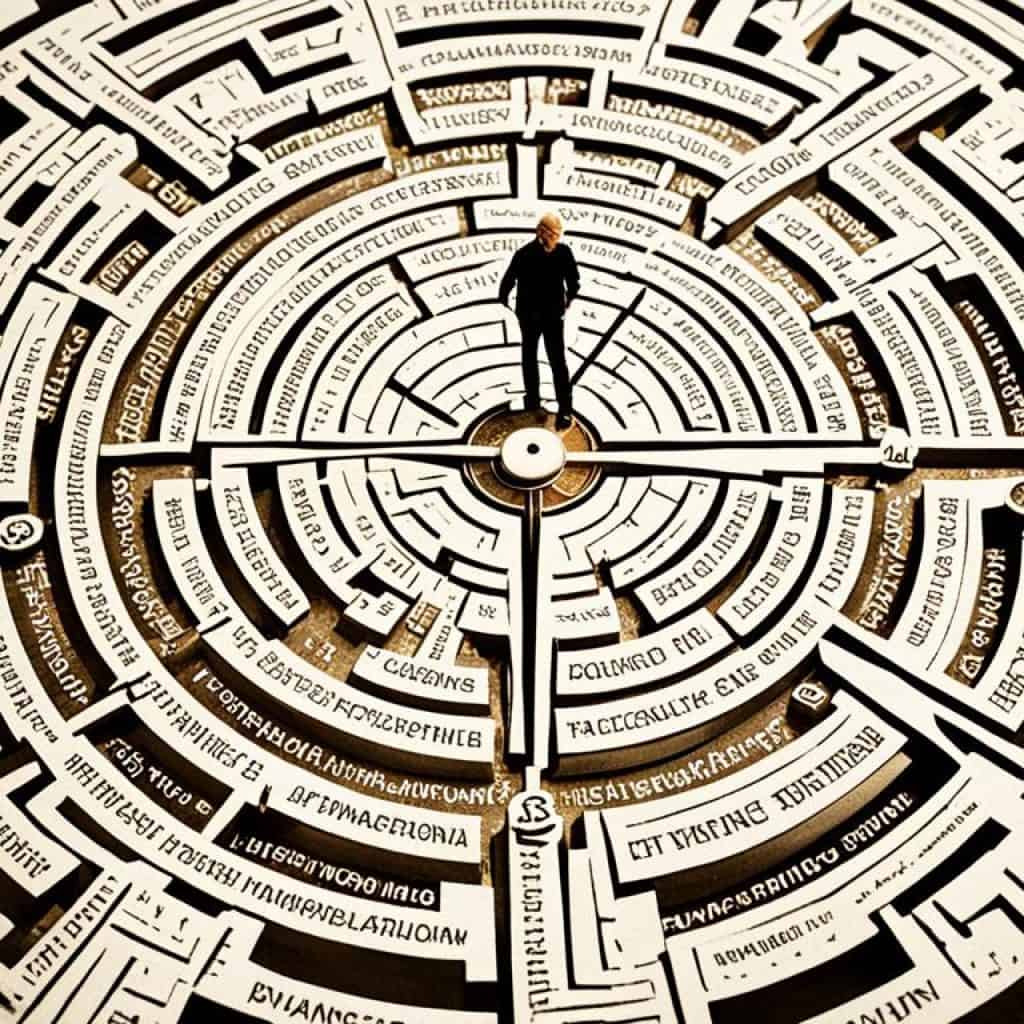Age gap relationships can bring both unique challenges and benefits for couples. Whether it’s an older partner with a younger partner or vice versa, the age difference can significantly impact the dynamics of the relationship. In this article, we will explore the societal perspectives, challenges, and potential benefits of age gap relationships and provide guidance on how to navigate them successfully.
When it comes to age gap relationships, societal perspectives can vary widely. Some people may question or judge the motivations of individuals involved in such relationships. It’s essential to remember that love is not defined by age and that two consenting adults have the right to pursue a relationship regardless of their age difference.
However, it’s crucial to acknowledge the challenges that may arise in age gap relationships. Partners may face differences in emotional maturity, priorities, and future planning due to variations in life experiences. They may also encounter concerns about end-of-life issues, societal stigma, and power imbalances. By addressing these challenges openly and proactively, couples can build a strong foundation for a successful and fulfilling relationship.
Despite the challenges, age gap relationships can also offer unique benefits. Partners can learn from each other’s perspectives, engage in mentorship opportunities, and experience personal growth. Additionally, age gap relationships can bring a sense of adventure and novelty, adding excitement and vibrancy to the partnership.
In the following sections, we will delve deeper into the various aspects of age gap relationships, including emotional maturity challenges, priorities and future planning, end-of-life concerns, societal stigma and judgment, power imbalances, setting boundaries, effective communication, finding support, the role of counseling, and factors that contribute to relationship success. By understanding and actively navigating each of these areas, couples can navigate the complexities of age gap dynamics and foster a strong and lasting connection.
Key Takeaways:
- Age gap relationships can bring unique challenges and benefits.
- Societal perspectives on age gap relationships may vary, but love should not be defined by age.
- Challenges may include differences in emotional maturity, priorities, and concerns about end-of-life issues.
- Benefits can include gaining different perspectives, personal growth, and experiencing adventure and novelty.
- By addressing challenges openly, setting boundaries, and engaging in effective communication, couples can navigate age gap dynamics successfully.
The Emotional Maturity Challenge
In age gap relationships, partners may encounter a significant difference in emotional maturity due to variations in life experiences. This maturity gap can present challenges in understanding and supporting each other emotionally, as each partner may have different perspectives, coping mechanisms, and emotional needs. It is important for couples to navigate this challenge together, proactively addressing any imbalances that may arise.
Communication lies at the heart of overcoming the emotional maturity challenge in age gap relationships. By fostering open and honest conversations, partners can gain insight into each other’s emotional worlds and bridge the gap that exists. Sharing fears, desires, and past experiences can lead to a deeper understanding and enable both individuals to offer the necessary support and empathy.
“Communication is the key to unlocking a deeper emotional connection and fostering a healthy and balanced age gap relationship.”
Building Emotional Bridges
To build emotional bridges, it is crucial for both partners to actively listen and validate each other’s feelings. This cultivates an atmosphere of trust, enabling emotional growth and connection. Recognizing and respecting each other’s emotions can create a safe space where partners feel comfortable expressing themselves without judgment.
Understanding that age gap relationships bring different perspectives and experiences is fundamental to the emotional maturity challenge. By acknowledging the impact of life experiences on emotional growth, partners can approach misunderstandings or conflicts with patience, empathy, and a willingness to learn from each other.
Fostering a Supportive Environment
Creating a supportive environment is vital in navigating the emotional challenges that arise from an age gap relationship. Partners should actively affirm and uplift each other, providing the emotional support needed during difficult times. By doing so, they can create a strong foundation of trust, allowing both individuals to feel understood, valued, and emotionally secure.
| Strategies | Benefits |
|---|---|
|
|
Incorporating these strategies into an age gap relationship can help couples navigate the emotional maturity challenge and continue to grow together. By addressing emotional imbalances proactively, partners can strengthen their emotional connection and create a harmonious and fulfilling relationship.
Priorities and Future Planning
When it comes to age gap relationships, partners may have different priorities and goals due to the disparities in their ages and life experiences. These differences can manifest in various aspects, including health, energy levels, plans for starting a family, and career aspirations. It is essential for couples to engage in open and honest conversations about their individual priorities and future plans to ensure alignment and create a shared vision for their relationship.
One of the primary challenges in age gap relationships is navigating the phase of life each partner is in. The older partner may already have established their career and be ready to settle down, while the younger partner may still be exploring their career options and focusing on personal growth. To address this, both partners must actively communicate their career goals and aspirations, allowing for mutual understanding and support.
Family planning is another crucial aspect to consider in age gap relationships. The younger partner may have a desire to start a family sooner, while the older partner may have already raised children or may be less inclined to have more. It is vital for couples to openly discuss their perspectives on family planning and come to a mutual agreement that respects their desires and values.
Furthermore, health disparities can impact the priorities and future planning of age gap couples. The older partner may face age-related health issues, while the younger partner may be in their prime physical condition. These differences necessitate open and empathetic discussions about healthcare priorities, lifestyle choices, and the support needed to maintain optimal well-being.
Creating a shared vision for the future in an age gap relationship requires compromise, understanding, and a willingness to adapt. It is essential for partners to consider each other’s priorities and work together to find common ground. By doing so, they can establish a strong foundation that takes into account their unique circumstances and paves the way for a fulfilling and enduring partnership.
End-of-Life Concerns
Couples in age gap relationships may have valid concerns about the mortality of the older partner and the implications for their future together. It’s natural to contemplate what will happen as time goes on and the potential challenges that may arise. However, addressing these concerns openly and proactively can help couples navigate through this complex aspect of their relationship.
Future planning becomes crucial in age gap relationships when considering end-of-life concerns. Open and honest discussions about expectations, fears, and desires can provide clarity and alleviate some of the anxieties associated with this topic. By openly sharing their thoughts and emotions, partners can offer reassurance and support to each other, strengthening their bond and easing any apprehensions they may have.
Having a secure support system is also vital for addressing end-of-life concerns. This includes not only emotional support but also practical assistance when needed. Couples should consider establishing a network of trusted friends, family members, or professionals who can be relied upon during difficult times. Knowing that there are people to turn to for help can provide peace of mind and a sense of security.
Creating a Support System
In order to create a robust support system, couples can consider:
- Identifying close friends or family members who can provide emotional support and understanding.
- Exploring resources within their community, such as support groups or organizations that cater to the needs of older adults.
- Building relationships with healthcare professionals who can offer guidance and assistance in times of need.
By taking proactive steps to establish a strong support system, couples can feel more confident in facing end-of-life concerns together. This support network can act as a source of comfort, ensuring that neither partner feels alone or overwhelmed during challenging times.

Societal Stigma and Judgment
Age gap relationships often face societal stigma and judgment. People make assumptions about the motivations of individuals involved in such relationships, which can negatively impact the couple’s dynamics. It is crucial for partners to navigate through this stigma and maintain a strong and healthy relationship despite societal pressures.
“Love is love, regardless of age.”
Setting boundaries is essential in dealing with societal judgment. By establishing clear boundaries, couples can protect themselves from unwanted external opinions and preserve their love. Effective communication is key to addressing any concerns or questions that may arise, both within the relationship and in response to societal judgment.
- Communicate openly and honestly about your relationship, addressing any concerns or fears that may arise.
- Find a support network of friends and family members who are accepting and understanding of your relationship. Surrounding yourself with positive influences can help combat the negativity associated with societal stigmas.
- Consider seeking professional counseling or therapy to navigate the challenges of societal judgment. A therapist can provide guidance and support to help you and your partner maintain a strong relationship despite external pressures.
It is important to remember that not all societal perspectives carry equal weight. By focusing on the love and connection between themselves, couples can rise above the criticism and judgment from others.
Recognizing Ulterior Motives
It is essential for individuals in age gap relationships to be aware of and address any ulterior motives that may exist. While many age gap relationships are built on genuine love and connection, there may be cases where individuals may have less honorable intentions.
Recognizing and discussing these ulterior motives early on can help protect both partners and ensure that their relationship is based on mutual respect and trust. By addressing any concerns about ulterior motives openly and directly, couples can navigate their relationship with confidence.
| Signs of Ulterior Motives | How to Address |
|---|---|
| Significant discrepancies in wealth or social status between partners. | Have open conversations about financial expectations and the role wealth plays in the relationship. |
| Excessive control or manipulation from one partner. | Set boundaries and communicate about the importance of equity and respect in the relationship. |
| Consistent disregard for the feelings or needs of one partner. | Address the issue directly and seek couples therapy if necessary to promote emotional well-being. |
By acknowledging and addressing any ulterior motives within an age gap relationship, couples can work towards building a genuine and healthy connection that withstands societal stigmas and fosters mutual growth and happiness.
Power dynamics can be a significant factor in age gap relationships, with the potential for an imbalance of authority and control. The older partner may naturally assume a more dominant role due to their life experience and maturity. Additionally, financial dependence can contribute to an uneven power dynamic, as the older partner may hold more control and influence over financial decisions.
It is essential for partners to address and acknowledge these power imbalances in order to maintain a healthy and equal relationship. Open communication is key, allowing both individuals to express their needs, concerns, and expectations. By discussing these dynamics openly, couples can work together to establish a system of shared decision-making and mutual respect.
“In age gap relationships, it is crucial for both partners to have a voice and an equal say in important matters. Mutual respect and understanding are vital to create a balanced and harmonious partnership.” – Relationship expert, Dr. Emma Johnson
In some cases, the older partner may unintentionally exert control or influence over their younger partner. It is important to identify and address any signs of manipulation or power abuse early on. Building self-confidence and assertiveness can empower the younger partner to assert their own needs and boundaries within the relationship.
Additionally, financial independence plays a significant role in reducing power imbalances. The younger partner should strive to achieve their own financial stability and contribute to the relationship’s financial decisions. This creates a level playing field and ensures that both individuals have an equal say in matters that involve money.
By actively addressing power dynamics within an age gap relationship, couples can nurture a relationship built on mutual respect, equality, and shared decision-making.
Signs of an Unhealthy Power Imbalance:
- One partner consistently makes all decisions without consulting or considering the other.
- The older partner uses their financial resources to control the relationship or manipulate the younger partner.
- The younger partner feels silenced or dismissed when expressing their opinions or desires.
- There is a lack of open communication and transparency regarding financial matters.
Strategies for Addressing Power Imbalances:
- Engage in regular open and honest communication about individual needs, expectations, and boundaries.
- Work together to establish shared decision-making processes that consider both partners’ perspectives.
- Promote financial independence for both partners, encouraging the younger partner to pursue their own career and financial goals.
- Attend couple’s therapy or seek guidance from a relationship counselor to navigate and address any power dynamics effectively.
Setting Boundaries
When it comes to age gap relationships, establishing clear boundaries is essential. Couples should communicate their boundaries to friends and family members who may question or judge their relationship. This not only helps protect the integrity of the relationship but also reminds others to respect the couple’s choice to be together.
Setting boundaries is a way for couples to define their own path and establish guidelines that align with their values and desires. By doing so, they create a safe and secure space for their relationship to flourish.
“Boundaries are not walls to keep people out; they are fences to show where you stop and others begin.”

Boundary-setting involves open and honest communication between partners. It requires discussing and agreeing upon expectations regarding personal space, privacy, social interactions, and other aspects that affect the relationship. By establishing these boundaries, couples can foster trust, maintain individuality, and ensure mutual respect.
Outside judgment can be a challenge in age gap relationships, but having clearly defined boundaries can help couples navigate societal opinions. It allows them to protect their relationship from unwarranted criticism and maintain their self-confidence.
Havig confidence in the relationship and oneself is crucial for overcoming outside judgment. When partners have a strong sense of self and belief in their connection, they can face societal stigma with resilience and determination.
Respect and Empathy: Foundation for Boundary-Setting
Setting boundaries also requires mutual respect and empathy. Partners must consider each other’s needs, emotions, and perspectives when establishing and maintaining boundaries. It is important to have open and nonjudgmental conversations about personal values, comfort levels, and expectations.
Respecting each other’s boundaries is a demonstration of love and care. It allows partners to feel seen, heard, and valued in the relationship. Mutual respect fosters a sense of security and emotional well-being.
Boundary-setting is a continuous process that evolves as the relationship grows and changes. Couples should regularly reassess their boundaries and make adjustments if necessary, ensuring their needs and desires are met, while also considering the growth and development of their partner.
By setting boundaries, age gap couples can cultivate a relationship that is based on mutual respect, self-confidence, and a shared understanding of their unique dynamic.
Effective Communication
Effective communication is vital for maintaining a healthy and fulfilling age gap relationship. It allows partners to connect on a deeper level, understand each other’s needs, and overcome any challenges that may arise. By fostering open dialogue, active listening, and empathy, couples can build a strong foundation of trust and understanding.
The Power of Open Dialogue
In age gap relationships, it is essential to create a safe space for open dialogue. This means encouraging honest and transparent conversations about thoughts, fears, desires, and concerns. Open dialogue allows partners to express themselves freely without judgment and promotes a deeper understanding of each other’s perspectives.
“Communication is the key to a successful age gap relationship. We make sure to have regular conversations about our needs, expectations, and concerns. It has helped us build a strong bond based on trust and mutual understanding.” – Emma
The Art of Active Listening
Active listening is a crucial component of effective communication. It involves being fully present, paying attention to the speaker, and genuinely seeking to understand their thoughts and emotions. By practicing active listening, partners can validate each other’s feelings and create a supportive environment for meaningful conversations.
- Give your partner your full attention by maintaining eye contact and avoiding distractions.
- Show empathy and understanding by validating their emotions and concerns.
- Ask clarifying questions to ensure you have a complete understanding of their point of view.
- Refrain from interrupting or dismissing their thoughts, allowing them to express themselves fully.
Cultivating Empathy and Understanding
Empathy plays a crucial role in effective communication within age gap relationships. It involves putting yourself in your partner’s shoes and understanding their perspective, experiences, and emotions. By cultivating empathy, couples can bridge communication gaps and foster a deeper connection.
“Empathy has been the key to our communication success. We make an effort to understand each other’s emotions, even when we may not fully relate to the experiences. It helps us create a safe and supportive environment where we can communicate freely.” – David
By actively incorporating open dialogue, active listening, and empathy into their communication, age gap couples can create a strong and harmonious relationship. Effective communication allows partners to navigate challenges, resolve conflicts, and build a lasting connection based on trust, understanding, and mutual growth.
Finding Support
Age gap couples often face unique challenges in their relationships and may find solace in connecting with like-minded couples who can relate to their experiences. Building a network of supportive friendships within the age gap community can provide validation, encouragement, and a sense of belonging. Through these connections, couples can find the support they need to navigate the ups and downs of their relationship.
Engaging with other like-minded couples creates an opportunity to share stories, advice, and resources. It allows couples to learn from the experiences of others who have faced similar challenges and found successful ways to overcome them. The age gap community can provide a safe space for couples to discuss their concerns, seek guidance, and gain insights from those who have been through similar situations.
“Being part of a community of age gap couples has been incredibly helpful for us. We have found friends who understand our journey, share their wisdom, and support us through thick and thin. It’s comforting to know that we are not alone, and we can always turn to our community when we need a listening ear or advice.”
Beyond emotional support, the age gap community can also offer practical guidance and resources. From relationship tips to strategies for dealing with external judgment, couples can benefit from the collective wisdom and experiences of others. Additionally, the age gap community often organizes events, workshops, and online forums where couples can come together, learn, and forge new friendships.
By actively seeking support from like-minded couples, age gap partners can find reassurance, validation, and a sense of community. These connections provide an invaluable source of encouragement, guidance, and companionship throughout their relationship journey.
Supportive Friends Make All the Difference
Building and maintaining supportive friendships outside of the age gap community is equally important. Friends who are understanding, non-judgmental, and accepting not only contribute to an individual’s overall well-being but also provide much-needed support for the couple as a whole. These friendships can serve as a buffer against outside skepticism and criticism, providing an anchor of support and love.
Joining Online Communities and Support Groups
To connect with other like-minded couples and find support, online communities and support groups are a valuable resource. These platforms offer a safe and inclusive space for sharing experiences, asking questions, and seeking advice. Engaging in these communities can help couples realize that they are not alone and that there are many people who understand and support their age gap relationship.
Whether it’s finding community through social media groups, participating in online forums, or joining dedicated support groups, the digital age has made it easier than ever for age gap couples to find the support they need.
| Benefits of Finding Support in the Age Gap Community | Ways to Connect with Like-Minded Couples |
|---|---|
|
|
By actively seeking support from the age gap community and building friendships with like-minded couples, age gap partners can create a strong support system that helps them navigate the unique challenges and joys of their relationship journey.
Counseling
Seeking professional guidance through age gap relationship counseling can provide valuable support and guidance for couples facing unique challenges. A couples counselor or therapist can offer expert advice and strategies to navigate the complexities of an age gap relationship, helping couples build a healthy and fulfilling partnership.
When it comes to age gap relationships, expert guidance plays a crucial role in addressing and overcoming relationship challenges. With the help of a trained professional, couples can gain valuable insights into the dynamics of their relationship and develop effective communication strategies to navigate through any obstacles that may arise.
Through age gap relationship counseling, couples can:
- Gain a deeper understanding of the impact of generational differences and societal perceptions on their relationship
- Address any power imbalances or concerns related to financial dependence
- Develop effective communication skills to bridge emotional gaps and foster a stronger connection
- Navigate issues related to future planning, such as family dynamics and career goals
By seeking expert guidance, couples can create a safe and judgment-free space to explore their relationship challenges and work towards building a strong and fulfilling partnership.
| Benefits of Age Gap Relationship Counseling | Expert guidance and support |
|---|---|
| Gain a deeper understanding of relationship dynamics | Address power imbalances and financial concerns |
| Develop effective communication skills | Navigate future planning and establish alignment |
Age gap relationship counseling allows couples to receive tailored guidance and support that specifically addresses the challenges they may face. With professional assistance, couples can overcome obstacles and build a resilient and fulfilling partnership that stands the test of time.
Relationship Success Factors
When it comes to age gap relationships, certain factors can contribute to their success and longevity. These factors include higher levels of education, financial security, strong communication skills, and a secure attachment style.
An individual’s level of education can play a role in a relationship’s success. Higher education often brings a broader perspective and a deeper understanding of oneself and others. It can promote intellectual discussions, shared interests, and a stronger bond between partners.
Financial security is another important factor. When both partners feel financially stable and secure, it reduces stress and allows them to focus on building a solid foundation for their relationship. Financial stability brings a sense of security and ensures that both individuals can contribute equally to the partnership.
Strong communication skills are crucial for any relationship to thrive. In an age gap relationship, effective communication becomes even more important due to potential generational differences and varied experiences. Partners must learn to express their needs, listen attentively, and find common ground to resolve conflicts and foster connection.
Attachment style, which refers to an individual’s way of connecting and relating to others, can influence the success of an age gap relationship. Secure attachment styles, characterized by trust, emotional availability, and a healthy sense of self, provide a strong foundation for a fulfilling and stable partnership.
“Successful age gap relationships thrive on a solid educational background, financial stability, effective communication, and a secure attachment style, all of which contribute to a long-lasting and fulfilling partnership.”
Age gap relationships that possess these success factors have a higher likelihood of thriving and enduring through the challenges that may arise. However, it is important to note that no relationship is without its own unique set of experiences and obstacles to overcome. By focusing on these success factors, couples in age gap relationships can build a strong foundation that allows them to navigate the complexities of their situation with love, understanding, and resilience.
Benefits of Age Gap Relationships
- Broadened Perspectives: Age gap relationships bring together individuals from different generations, each with their own unique life experiences and perspectives. This diversity cultivates a deeper understanding of different eras, cultures, and social contexts, broadening horizons and enhancing overall personal growth.
- Mentorship and Learning: In age gap relationships, partners often have the opportunity to learn from each other’s experiences. The older partner can provide guidance, wisdom, and mentorship to the younger partner, supporting their personal and professional development. Meanwhile, the younger partner can offer fresh insights, technological expertise, and new perspectives, creating a mutual exchange of knowledge.
- Personal Development: Age gap relationships can serve as catalysts for personal growth and self-discovery. The dynamics within these relationships often encourage partners to step outside of their comfort zones, challenging themselves to evolve and adapt to new experiences and perspectives.
- Sense of Adventure and Novelty: Age gap relationships provide an element of excitement and novelty. Both partners have the opportunity to explore new hobbies, travel to different places, and engage in activities that they might not have otherwise tried. This sense of adventure can inject vitality and joy into the relationship, fostering a deep sense of connection and shared experiences.
These benefits contribute to a vibrant and fulfilling relationship that continuously evolves and brings joy to both partners. Embracing the unique dynamics of an age gap relationship can open doors to personal and mutual development, offering a journey of growth, learning, and adventure.
Challenges of Age Gap Relationships
Age gap relationships present unique challenges that couples must navigate in order to maintain a healthy and resilient bond. These challenges encompass generational differences, social integration, and health disparities. By acknowledging and proactively addressing these obstacles, couples can strengthen their relationship and foster a deeper connection.
1. Navigating Generational Differences
In age gap relationships, partners often come from different generations, which can result in contrasting perspectives, values, and experiences. It is essential for couples to bridge these generational differences through open-mindedness, empathy, and a willingness to understand each other’s unique backgrounds. By celebrating the richness of diverse perspectives, couples can foster mutual growth and enrich their relationship.
2. Integrating into Each Other's Social Circles and Families
Integrating into each other’s social circles and families can pose challenges in age gap relationships. Friends and family members may express skepticism or concern, making it crucial for couples to communicate openly and set boundaries. Building trust, showing respect, and addressing any misconceptions or prejudices can help alleviate tension and create a supportive environment for the relationship to thrive.
3. Addressing Health Disparities
Age gap relationships can involve partners with significant differences in health and vitality levels. It is important for couples to navigate these health disparities with compassion and understanding. Communicating openly about health concerns, seeking professional medical guidance, and adapting lifestyle choices to accommodate each partner’s needs can contribute to the overall well-being of the relationship.
“In any age gap relationship, challenges are inevitable. Navigating generational differences, integrating into each other’s social circles, and addressing health disparities require open communication, empathy, and respect. By embracing these challenges, couples can strengthen their bond and foster a resilient and fulfilling partnership.”
Age gap relationships are not without their share of challenges. However, by acknowledging and proactively addressing the generational differences, social integration concerns, and health disparities, couples can create a solid foundation for a healthy and resilient relationship. With love, understanding, and effective communication, age gap couples can overcome these challenges and build a bond that transcends age.
Strategies for Navigating Age Gap Challenges
Age gap relationships can present unique challenges that require proactive strategies for success. By prioritizing open communication, building self-confidence, finding compromises, and practicing empathy and understanding, couples can navigate these challenges and foster a strong foundation for their relationship.
1. Open Communication
Open communication is essential in age gap relationships. Partners should create a safe and non-judgmental space for honest dialogue, enabling them to express their thoughts, concerns, and desires. Active listening and validating each other’s experiences can foster a deeper connection and mutual understanding.
2. Building Self-Confidence
Building self-confidence is crucial for both partners in an age gap relationship. It involves recognizing and appreciating individual strengths, qualities, and accomplishments. By nurturing self-esteem, partners can bring a sense of security and assurance to the relationship, allowing them to navigate challenges with resilience.
3. Finding Compromises
Age gap relationships often involve differing perspectives and priorities. It is important for partners to find common ground through compromise. By actively seeking solutions that address both partners’ needs, couples can build harmony and strengthen their relationship.
4. Practicing Empathy and Understanding
Empathy is a powerful tool for navigating age gap challenges. Partners should strive to understand each other’s experiences, beliefs, and emotions. Taking the time to empathize with one another fosters mutual respect, strengthens the emotional bond, and promotes a supportive environment within the relationship.
“Open and honest communication, self-confidence, compromise, and empathy are vital strategies for age gap couples seeking a harmonious and fulfilling relationship. By embracing these strategies, couples can overcome challenges and build a strong foundation based on love and understanding.”
By implementing these strategies, age gap couples can overcome obstacles and develop a relationship that is grounded in mutual respect, understanding, and growth. It is through open communication, self-confidence, compromise, and empathy that age gap relationships can thrive and withstand the test of time.
| Strategies for Navigating Age Gap Challenges |
|---|
| Open communication |
| Building self-confidence |
| Finding compromises |
| Practicing empathy and understanding |

Conclusion
Age gap relationships, just like any other type of relationship, come with their own set of challenges and benefits. However, it’s important to remember that love transcends age. With conscious relationship design and effective communication, couples can create a strong and fulfilling connection that defies societal expectations.
By embracing the unique dynamics of age gap relationships and navigating through the challenges that arise, couples have the opportunity to build a lasting partnership based on love, understanding, and mutual growth. It is through open dialogue, active listening, and empathy that partners can bridge any gaps caused by the age difference and find common ground.
Furthermore, age gap relationships offer a chance for personal development and an expanded perspective. Both partners can learn from each other’s different experiences, and the older partner may provide mentorship and guidance. This adds an element of adventure and novelty to the relationship, enriching the journey for both individuals.
In conclusion, age gap relationships require conscious effort and intentional relationship design. By prioritizing effective communication, setting boundaries, and seeking support when needed, couples can overcome challenges and build a solid foundation for their love to thrive. Love knows no boundaries, and age should never be a barrier to finding deep and meaningful connections.
FAQ
What are the challenges of age gap relationships?
Age gap relationships can present challenges such as differences in emotional maturity, priorities and future planning, concerns about end-of-life issues, societal stigma and judgment, power imbalances, and the need to set boundaries.
How can couples navigate the challenges of an age gap relationship?
Couples in age gap relationships can navigate the challenges by prioritizing open communication, building self-confidence, finding compromises, and practicing empathy and understanding.
What opportunities do age gap relationships offer?
Age gap relationships offer opportunities for broadened perspectives, learning and mentorship, personal growth and development, and a sense of adventure and novelty.
How can age gap couples find support?
Age gap couples can find support by connecting with other like-minded couples who understand their unique challenges and experiences, building a network of supportive friendships, and seeking the help of a couples counselor or therapist.
What factors contribute to the success of an age gap relationship?
Factors such as higher levels of education, financial security, strong communication skills, and a secure attachment style can contribute to the success of an age gap relationship.








Add comment